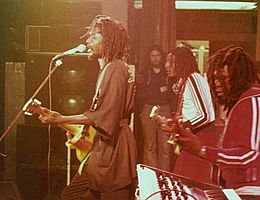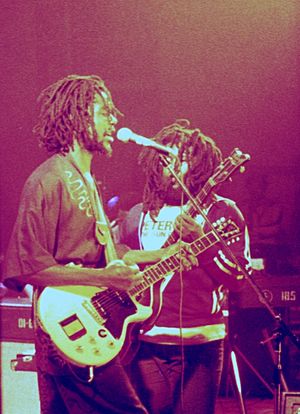Peter Tosh facts for kids
Quick facts for kids
Peter Tosh
OM
|
|
|---|---|

Tosh (left) on the Bush Doctor tour in 1978, with Al Anderson (guitar) and Robbie Shakespeare (bass)
|
|
| Background information | |
| Birth name | Winston Hubert McIntosh |
| Also known as | Stepping Razor |
| Born | 19 October 1944 Grange Hill, Jamaica |
| Died | 11 September 1987 (aged 42) Kingston, Jamaica |
| Genres | Reggae, ska, rocksteady. |
| Occupation(s) | Musician, singer-songwriter |
| Instruments |
|
| Years active | 1961–1987 |
| Labels | Intel-Diplo, JAD Records |
| Associated acts |
|
Winston Hubert McIntosh, known professionally as Peter Tosh, was a famous reggae musician from Jamaica. He was born on October 19, 1944, and passed away on September 11, 1987. Peter Tosh was a key member of the band the Wailers from 1963 to 1976. After that, he became a very successful solo artist. He also helped share the ideas of the Rastafari faith with the world.
Contents
Early Music and The Wailers
Peter Tosh was born in Westmoreland, a parish in western Jamaica. He was raised by different relatives because his parents were not around. When he was 15, he moved to Trenchtown in Kingston, Jamaica. He learned to play the guitar by watching someone play a song. He watched for hours, remembering how the person's fingers moved. Then, he picked up the guitar and played the song himself!
In the early 1960s, Peter Tosh met Bob Marley and Bunny Wailer at music lessons given by Joe Higgs. The three friends started singing together in 1962. Higgs taught them how to sing in harmony. They often practiced and played music on the streets of Trenchtown.
In 1964, Tosh helped form the band the Wailing Wailers. At first, Peter Tosh was the only one in the group who could play instruments. He taught himself guitar and keyboard. This inspired the other band members to learn instruments too.
The Wailing Wailers had a big ska hit with their first song, "Simmer Down." They recorded more successful songs. Later, Bob Marley spent some time in the United States. When he came back, he, Tosh, and Bunny Wailer became deeply involved in the Rastafari faith. They then changed the band's name to the Wailers. Tosh explained that "wail" means to express strong feelings through singing.
The Wailers started working with producers like Lee "Scratch" Perry. They created some of the first well-known reggae songs, such as "Soul Rebel" and "Duppy Conqueror." In 1970, Aston "Family Man" Barrett and his brother Carlton Barrett joined the band. They recorded the album The Best of The Wailers in 1971.
In 1972, the band signed with Island Records. They released their first album, Catch a Fire, in 1973. This was followed by Burnin' and Natty Dread the same year.
After the president of Island Records did not want to release his solo album, Peter Tosh and Bunny Wailer left the Wailers in 1974. They felt they were not treated fairly. In 1976, Tosh began recording with CBS Records. A book later said that Tosh raised money to fund his albums.
Solo Career
Peter Tosh started making his own albums. His album Equal Rights came out in 1977. It included his version of "Get Up, Stand Up", a song he wrote with Bob Marley. It also had a cover of "Stepping Razor."
Tosh formed a band called Word, Sound and Power to tour with him. In 1978, Rolling Stones' record label signed Tosh. They released his album Bush Doctor, which helped him reach more fans. This album featured Mick Jagger and Keith Richards from the Rolling Stones. Tosh sang a duet with Mick Jagger on the song "Don't Look Back."
He released two more albums on Rolling Stones Records: Mystic Man (1979) and Wanted Dread and Alive (1981). Peter Tosh wanted to be popular while still sharing his strong beliefs. He had some success, but not as much as Bob Marley.
After his 1983 album Mama Africa, Tosh took a break from music. He traveled to Africa to seek spiritual advice. He also wanted to change his recording agreements. Tosh had disagreements with his record label, EMI, because he felt they were not promoting his music enough.
Peter Tosh also spoke out against apartheid in South Africa. Apartheid was a system of unfair racial separation. He performed at anti-apartheid concerts and sang about it in songs like "Apartheid" and "Equal Rights." In 1987, Peter Tosh's career seemed to be getting stronger. He won a Grammy Award for Best Reggae Performance for his last album, No Nuclear War.
Death
Peter Tosh sadly passed away on September 11, 1987.
Legacy
In 1993, a documentary film called Stepping Razor: Red X was released. It told the story of Peter Tosh's life, music, and how he died. The film was based on recordings Tosh himself had made.
A special monument to Peter Tosh is kept by his family near Negril, Jamaica. It is open to the public, and his birthday is celebrated there every year with live reggae music.
In October 2012, Peter Tosh was given Jamaica's fourth highest honor, the Order of Merit.
A square in Kingston was renamed Peter Tosh Square. The Peter Tosh Museum opened there in October 2016. The museum displays many items from his life, including his famous M16 guitar.
A photo of Peter Tosh from 1964, showing him in sunglasses and a suit with Bob Marley and the other Wailers, inspired a famous logo. This photo was used in 1979 for the logo of 2 Tone Records, a music label that released albums by ska bands like The Specials. The logo showed a stylish figure based on Tosh from the photo. This figure was called "Walt Jabsco."
The 2 Tone Records logo later inspired a drawing in a Microsoft font called Webdings. This font was made in 1997 and used symbols instead of letters. The designer, Vincent Connare, was a fan of The Specials. He used the Walt Jabsco image as a basis for one of the Webdings symbols. He changed the design so Tosh faced forward and looked like he was floating. In Webdings, you can see this symbol by typing a lowercase "m."
Connare's Webdings design was later added to the emoji system in 2014. It is known as the "Man in Business Suit Levitating emoji." Peter Tosh himself never knew about the emoji because he died before emojis existed. However, his children, Andrew Tosh and Niambe McIntosh, know about it. When they learned the story behind the emoji, they both said it was a good thing. Andrew said that his father "wanted [people] to dance to their own (political) awakening."
The annual Peter Tosh Gala Awards event started in 2017.
In October 2019, a special blue plaque was placed in London to honor Bob Marley, Peter Tosh, and Bunny Wailer. It is at the old site of Basing Street Studios, where their albums Catch a Fire and Burnin' were finished.
M16 Guitar
In 1983, during Peter Tosh's Mama Africa tour, a musician gave him a special gift. It was a guitar shaped like an M16 rifle. Tosh loved the gift. The guitar was lost by airlines when the tour went to Europe, but it was found again. Tosh then performed on stage with this unique guitar.
In 2006, there was a plan to sell the guitar at an auction. However, Tosh's sons, Andrew Tosh and Jawara McIntosh, stopped the sale. They said the guitar belonged to them. In 2011, Andrew Tosh said the guitar was safe with a friend. It was waiting for the opening of a museum dedicated to Peter Tosh.
The Peter Tosh Museum officially opened on Peter Tosh's 72nd birthday, October 19, 2016, in Kingston, Jamaica.
Personal Life
Religion
In the late 1960s, Peter Tosh, Bob Marley, and Bunny Wailer became followers of Rastafari. One of the beliefs of Rastafari is that Haile Selassie, the Emperor of Ethiopia, was a special messenger of God. Because of this belief, the three friends were baptized into the Ethiopian Orthodox Church.
Unicycling
After he left the Wailers, Peter Tosh became very interested in unicycles. He became a skilled unicycle rider. He could ride forwards, backwards, and even hop! He often surprised his audiences by riding his unicycle onto the stage for his shows.
Discography
Studio Albums
| Year | Album details | Peak chart positions | ||||
|---|---|---|---|---|---|---|
| US | US R&B |
UK | AUS | |||
| 1976 | Legalize It
|
199 | – | 54 | – | |
| 1977 | Equal Rights | 146 | – | – | – | |
| 1978 | Bush Doctor
|
104 | – | – | 34 | |
| 1979 | Mystic Man
|
104 | – | – | 72 | |
| 1981 | Wanted Dread & Alive
|
91 | 40 | – | – | |
| 1983 | Mama Africa
|
59 | 49 | – | 47 | |
| 1987 | No Nuclear War
|
– | – | – | – | |
| "—" means the album did not appear on the charts or was not released in that country. | ||||||
Live Albums
- Captured Live (1984)
- Live at the One Love Peace Concert (2000)
- Live & Dangerous: Boston 1976 (2001)
- Live at the Jamaica World Music Festival 1982 (2002)
- Complete Captured Live (2002)
- Live at My Father's Place 1978 (2014)
Compilations
- The Toughest (1988)
- Honorary Citizen (1997)
- Scrolls of the Prophet: The Best of Peter Tosh (1999)
- Arise Black Man (1999)
- Black Dignity (Early Works of the Stepping Razor) (2001)
- I Am That I Am (2001)
- The Best of Peter Tosh 1977–1987 (2003)
- Can't Blame the Youth (2004)
- Black Dignity (2004)
- Talking Revolution (2005)
- The Ultimate Peter Tosh Experience (2009)
Appears On
- The Wailing Wailers (1965)
- Negril (Eric Gale, 1975)
- Rastafari Dub (Ras Michael & The Sons of Negus, 1975)
- Blackheart Man (Bunny Wailer, 1976)
- Word Sound and Power (Chris Hinze, 1980)
See also
 In Spanish: Peter Tosh para niños
In Spanish: Peter Tosh para niños
- List of reggae musicians
 | William L. Dawson |
 | W. E. B. Du Bois |
 | Harry Belafonte |



